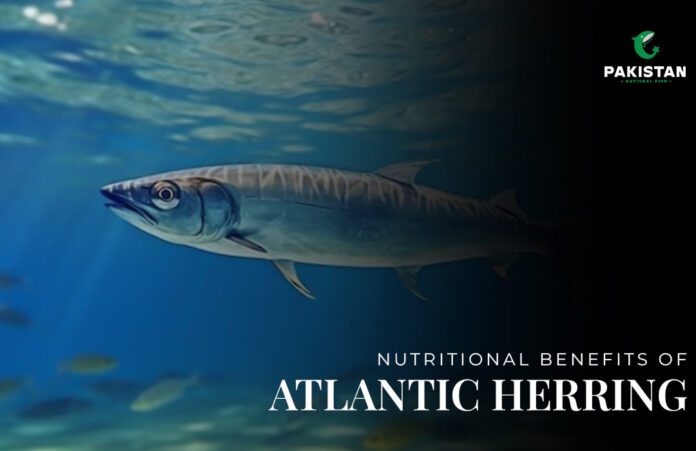The North Atlantic Ocean is home to the tiny, oily fish known as Atlantic herring. It is a famous seafood in several nations, including Canada, Iceland, and Norway. The advantages of eating Atlantic herring for health have drawn more attention in recent years.
Therefore, in this blog, we will discuss the several nutritional benefits of Atlantic Herring.
What Is Atlantic Herring?
Whitefish called herring are found mostly in the ocean, but they hatch in freshwater. The waters surrounding Scotland and Northern Ireland are home to the great bulk of herring, yet they can be found in oceans all over the world.
A dish that is rich in nutrients, herring can be included in a wide variety of fish recipes from different cultures. Consuming herring may provide several excellent health benefits, whether it is the star of a meal or is used as a high-protein snack.

Health Benefits of Herring Fish
1. Essential Fatty Acids and Vitamins
Particularly rich in fat-soluble vitamins and Omega-3 fatty acids, herring fish is a nutritional powerhouse. Eicosapentaenoic acid (EPA) and docosahexaenoic acid (DHA) are two of the long-chain Omega-3 polyunsaturated fatty acids (PUFA) that herring, an oily fish, is rich in.
Not only are these fatty acids essential for heart health and brain development, but they also play a major role in lowering inflammation. A vital role in cognitive function and visual acuity, the high amounts of DHA in herring are particularly significant for the development of the brain systems in newborns and early children.
2. High-Quality Protein
Herring is a great source of high-quality protein in addition to being abundant in healthy fats. The protein in herring is easily absorbed by the body and contains all the necessary amino acids in the proper amounts. Because of this, herring is a perfect diet to help muscle tissue preservation and growth. The synthesis of hormones and enzymes, as well as cellular repair, depend heavily on the amino acids found in herring.
Herring is a great addition to the diet for people trying to increase their consumption of protein, especially in a way that supports overall health. It provides essential elements that work in combination to promote overall well-being in addition to protein.
3. Cardiovascular Health Benefits
Because herring fish has a high amount of Omega-3 fatty acids, eating it has been associated with considerable advantages to cardiovascular health. Numerous studies have shown that by decreasing blood pressure, avoiding blood clot formation, and reducing inflammation, omega-3 fatty acids can reduce the risk of heart disease.
In the historic “GISSI Prevention Trial,” those who had heart attacks and took a daily 1-gram capsule containing Omega-3 fats for three years had a markedly decreased chance of having another heart attack, having a stroke, and passing away suddenly as opposed to people who took a placebo. These results underline the role that Omega-3 fatty acids play in heart health maintenance and herring’s status as a heart-healthy diet that can support long-term cardiovascular health.
4. Vitamin A and Vision Health
With 84 IU per 100 grammes, herring is a small yet valuable source of vitamin A. Vitamin A is essential for supporting the integrity of mucosal surfaces throughout the body and for preserving good vision, particularly in low light. Additionally important to immunological function, this vitamin keeps skin and mucous membranes healthy, which helps the body fight off infections.
Because herring contains both Omega-3 fatty acids and vitamin A, it is very good for your eyes, strengthening your general vision and lowering your risk of age-related macular degeneration, which is the main cause of vision loss in older persons.
5. Vitamin D and Bone Health
Herring is a great source of vitamin D, with 168 IU per 100 grammes, or around 42% of the daily required requirement, in addition to its Omega-3 and vitamin A content. In order to maintain sufficient blood calcium and phosphate concentrations for appropriate bone mineralisation, as well as to absorb calcium from food, vitamin D is crucial for calcium metabolism. Because of this, herring has a special benefit for bone health, preventing bone disorders like osteoporosis.
Moreover, studies have demonstrated the possible protective benefits of vitamin D against specific cancer types, such as breast, prostate, and colon cancer. For these reasons, herring is not only a meal that builds bone but may also be an ally in the fight against cancer.
6. Low Mercury and Nutrient-Rich
The low mercury concentration of herring makes it a safe seafood choice for frequent eating, which is one of its main advantages. The FDA recommends that even pregnant women can safely take 8 to 12 ounces (340 grams) of herring per week since it is a “best-choice” low-mercury fish.
Herring is a great option for people who want to eat more fish without running the danger of higher mercury levels in other seafood varieties because of its low mercury content and strong nutritional profile. Furthermore, herring is a prime source of bone-building elements including calcium, phosphorus, and magnesium, all of which are necessary for healthy teeth and bones.
Conclusion
Among the many health advantages of fish, smoked herring fish is particularly healthy. Its abundance of omega-3 fatty acids, top-notch protein, and vital vitamins like A and D greatly support bone strength, cognitive function, cardiovascular health, and eyesight. Regular intake of smoked herring is safe and advantageous due to its low mercury concentration. Including smoked herring in your diet may improve your general health and offer you a tasty method to get the nutrients you need.


